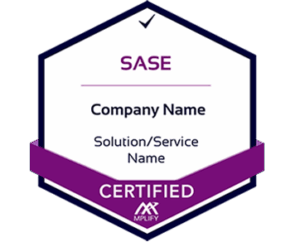Enterprises individually face the third largest economy of the world after those of the US and China—the cybercrime economy that is growing 15% each year. It was a $3 trillion industry in 2015 and will grow to a $10.5 trillion industry by 2025. The cybercrime economy already costs the real and productive global economy a trillion dollars in damages annually.
Enterprises also face a bewildering range of cybersecurity technology solutions that tackle different layers and areas of the cyberthreat landscape, as well as increasing demands for compliance from regulators, shareholders, and insurance companies while maintaining the performance of the critical business applications.
In response to these major challenges for enterprises worldwide, leading cybersecurity and application assurance technology providers have helped to develop and publish industry standards and drive a new, modular SASE Certification program underpinned by those standards. Together, these standards and certification program help enterprises maintain application performance and protect business and customer data in the constantly evolving worlds of cybercrime and cybersecurity.
MEF State of the Industry Report: SASE
The risk of major cyberattacks has never been greater. Organizations are responding by making cybersecurity a top priority for digital technology investment. Find out how…
SASE Certification = SD-WAN Certification + SSE Certification + Zero Trust Certification
Our approach to SASE certification of technology solution providers is modular.
 Under the unifying umbrella of SASE, technology providers can certify their solutions’ effectiveness in the following categories:
Under the unifying umbrella of SASE, technology providers can certify their solutions’ effectiveness in the following categories:
Service providers, in turn, demonstrate that they are using certified SD-WAN, Zero Trust, and SSE components for their SASE services by inheriting the certifications of their technology providers.
CyberRatings.org is a nonprofit organization formed by former executives from NSS Labs to provide transparency through testing.
NSS Labs was an independent analysis and testing company recognized around the world for its fact-based cybersecurity guidance. Vikram Phatak, founder of CyberRatings.org, was CEO of NSS Labs from 2007–2018.
Launched in December 2020, CyberRatings acquired the assets of NSS Labs to jump start its testing program. Initial testing began in a dedicated data center followed by a physical lab now running in Austin, Texas.
CyberRatings proprietary ratings system (similar to Moody’s) provides guidance on products and services capabilities in a language understood by all.
Mplify SASE Certification enables technology suppliers to establish a standards-compliant presence within a federation of automated networks for cybersecurity.
All SD-WAN certified technology providers are listed in the Technology Certification Registry
Mplify SASE Certification Data Sheet — 2025 Sep
Product Portfolio: SASE, SD-WAN Certification, Zero Trust Certification, SSE Certification, SASE Certification
Mplify SASE Certification validates the cyber-defense effectiveness and application performance of SASE solutions. This data sheet provides an overview of certification scope and process.
MEF-Certified SASE and SD-WAN Webinar — 2025 Apr
Product Portfolio: SASE Certification, SASE, SD-WAN Certification, SD-WAN
Tags: SASE
Looking to stand out in the competitive SASE and SD-WAN market? In this webinar, you'll discover how MEF certification enables service providers to offer high-performance solutions validated against stringent security and application performance criteria.
MEF SASE Certification – Frequently Asked Questions — 2025 Mar
Product Portfolio: SASE, SD-WAN Certification, Zero Trust Certification, SSE Certification, SASE Certification
Tags: Certification
Addressing over 40 common questions with links to additional materials.
MEF Certified SASE RFI Template for Enterprises — 2025 Feb
Product Portfolio: SASE Certification, Enterprise APIs, SASE, SD-WAN Certification, Zero Trust Certification, SSE Certification
This RFI template helps enterprise buyers evaluate certified, standards-based Secure Access Service Edge (SASE) solutions that integrate SD-WAN, Zero Trust, and Security Service Edge (SSE) capabilities.
MEF 138 Security Functions for IP Services — 2024 Jul
Product Portfolio: Zero Trust Certification, SSE Certification, SASE Certification, IP
This Standard specifies the requirements needed to add Security Functions to an IP Service.